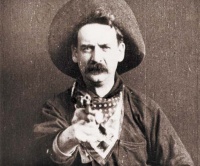Villain
From The Art and Popular Culture Encyclopedia
| Revision as of 21:09, 2 January 2021 Jahsonic (Talk | contribs) ← Previous diff |
Revision as of 13:06, 24 June 2021 Jahsonic (Talk | contribs) Next diff → |
||
| Line 1: | Line 1: | ||
| + | {| class="toccolours" style="float: left; margin-left: 1em; margin-right: 2em; font-size: 85%; background:#c6dbf7; color:black; width:30em; max-width: 40%;" cellspacing="5" | ||
| + | | style="text-align: left;" | | ||
| + | "[The] “[[villain|evil man]] is of little interest to either [[Cormac McCarthy]], the author of the novel, ''[[No Country for Old Men]]'', or to [[Coen brothers|Joel and Ethan Coen]], the makers of [[No Country for Old Men (film) |the movie]]. What is of interest to McCarthy and the Coens is rather what happens when [[hamartia|a good, but flawed]], man encounters this force of nature in human guise. In this sense, ''No Country for Old Men'' recapitulates the patters of ancient [[Greek tragedy]]."--[[Richard Gilmore]] cited in ''[[The Philosophy of the Coen Brothers]]'' (2008) by Mark T. Conard | ||
| + | |} | ||
| [[Image:Great Train Robbery still, public domain film.jpg|thumb|right|200px|A [[film still]] from the ''[[Great Train Robbery]]'', a [[robber]] shooting at the [[projection screen]].]] | [[Image:Great Train Robbery still, public domain film.jpg|thumb|right|200px|A [[film still]] from the ''[[Great Train Robbery]]'', a [[robber]] shooting at the [[projection screen]].]] | ||
| {{Template}} | {{Template}} | ||
Revision as of 13:06, 24 June 2021
|
"[The] “evil man is of little interest to either Cormac McCarthy, the author of the novel, No Country for Old Men, or to Joel and Ethan Coen, the makers of the movie. What is of interest to McCarthy and the Coens is rather what happens when a good, but flawed, man encounters this force of nature in human guise. In this sense, No Country for Old Men recapitulates the patters of ancient Greek tragedy."--Richard Gilmore cited in The Philosophy of the Coen Brothers (2008) by Mark T. Conard |
|
Related e |
|
Featured: |
A villain (also known as, "black hat", villainess in its feminine form) is a fictional character, whether based on a historical narrative or one of literary fiction. Random House Unabridged Dictionary defines such a character as "a cruelly malicious person who is involved in or devoted to wickedness or crime; scoundrel; or a character in a play, novel, or the like, who constitutes an important evil agency in the plot".
Its structural purpose is to serve as the opposition of the hero character and their motives or evil actions drive a plot along. In contrast to the hero, who is defined by their feats of ingenuity and bravery and their pursuit of justice and the greater good, a villain is often defined by their acts of selfishness, stupidity, evilness, craziness, cruelty, cunning and displays immoral behavior that can oppose or pervert justice. The antonym of a villain is a hero.
See also
Contrast


